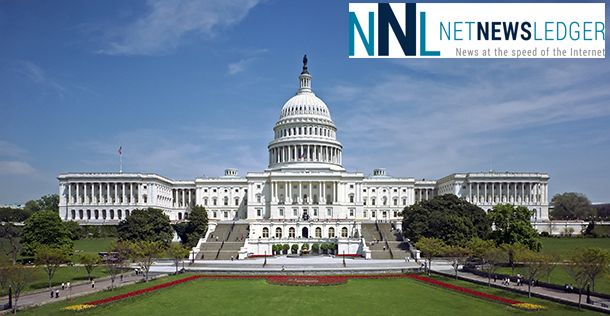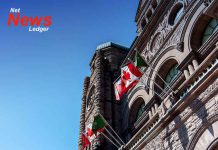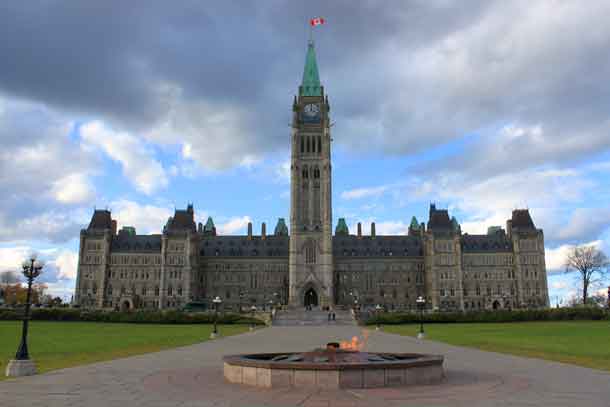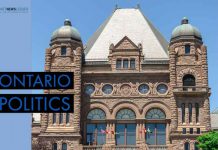 NEW YORK – POLITICS – Last week, I registered to vote for the first time in a U.S. election. As a Canadian with dual citizenship living in the United States, and an inveterate political junkie, this summer and fall gives me the gift of a double feature – two campaigns happening simultaneously in each of the countries I consider home.
NEW YORK – POLITICS – Last week, I registered to vote for the first time in a U.S. election. As a Canadian with dual citizenship living in the United States, and an inveterate political junkie, this summer and fall gives me the gift of a double feature – two campaigns happening simultaneously in each of the countries I consider home.
But that statement needs a qualification. In the U.S., a vote for president is still more than 14 months away – or, roughly the gestation period of a walrus. At least Canada has the contenders in place. In the U.S., we don’t even yet know who will ultimately be running against whom.
The stump speeches are just the pageant preliminaries before the showdown of the swimsuit competition to come in 2016. This makes me react with amusement when I hear commentators north of the border refer to the 77-day Canadian campaign set to culminate on Oct. 19 as a ‘marathon.’
At the launch of the campaign, national affairs writer Tim Harper of the Toronto Star illustrated the magnitude of this attention-grabbing, soul-sucking demand on the innocent Canuck when he outlined the true magnitude of 77 days as a period of time “. . . that will traverse three holiday weekends, almost three calendar months and two seasons.”
THREE holiday weekends? Oh, the inhumanity!
In many ways, the two approaches to electing leaders is a reversal in perceived national character: a short campaign seems brash and bold – as swift and soaring as an eagle in flight. It is the ‘shock-and-awe’ method of choosing leaders.
In contrast, a campaign extended well beyond a year before the eventual vote seems somewhat plodding and methodical. It seems consistent with ‘peace, order and good government’ and the Canadian penchant for parliamentary commissions that are almost duty-bound not to report their findings until the issue they are contemplating has become safely moot. It is more tortoise than hare, and all beaver.
Don’t get me wrong, I prefer our Canadian expediency to the obsessive odyssey that is American politics. Far better that we save protracted competition lasting months on end for the truly critical things – like determining a Stanley Cup winner.
The advantages of a short campaign are clear: It allows voters to bring a laser-like focus to issues that are not likely to change by election day – things like Mike Duffy’s expenses or Justin Trudeau’s hair. But the biggest disadvantage to entertainment value I see is that the 77-day sprint (yes, that’s what it really is) does not allow nearly enough time for politicians to truly go off the rails with foot-in-mouth disease born of fatigue.
That is where U.S. politics shines. Because of the length of what is an actual marathon, all candidates have an equal opportunity to say things at any given time that are loopy enough to brush up against lunacy. Think of Chris Christie’s suggestion that visitors to the U.S. be tracked like FedEx packages, and Scott Walker’s musing that a border wall between Canada and the United States might not be such a bad idea.
As an aside, I am not sure how this wall-frenzy was born and took root in Republican hearts and minds. After all, it was the Republican Supreme Being – Ronald Reagan – who gave the end of the Cold War its most iconic command: “Mr. Gorbachev, tear down this wall!”
I think walls are just so old school. Why not a dome like in the Simpson’s movie, or Stephen King’s imagination? This would protect the U.S. from land, sea, or air. Encasing the country like a pastry on a diner counter is not just inherently more secure; it is aesthetically more pleasing. Future earthquakes might cause a beautiful snow globe effect, and all of us on the outside would be able to say “ahhhhhh.”
In Canada, even with the added opportunity of making flubs in two official languages, we are rarely treated to a candidate spouting anything so ridiculous that it becomes sublime. The only possible exception is Prime Minister John Turner throwing up his hands during a debate in 1984 and saying “I had no option,” in response to attacks from Brian Mulroney about patronage appointments in the waning days of Pierre Trudeau’s time in office.
But the most significant Canadian advantage I see is that all the players are known. Absent of divine intervention, voters know what their choices will be on Oct. 19. This is far from the case in the U.S., where the eventual winner and next president could be someone not even running now.
For pure entertainment value, Joe Biden would be more than we could hope for. What’s also a bit macabre is that between now and the national party conventions next summer, failed candidates will fall by the wayside like so many castaways on Survivor whose torches are snuffed.
But back to my U.S. voter registration. Having been a poll worker in past Canadian elections, I was disconcerted to discover that here I was expected to identify my party affiliation on the official form. This seemed vaguely Soviet to me for the land of the free.
As there was no box to check that said ‘ex-pat Canadian’ or ‘Habs fan’ I chose ‘Other.’ It seemed the safest, most neutral, least dogmatic and least attention-getting choice of all.
And what could be more Canadian than that?
Gavin MacFadyen is a lawyer and freelance writer living in New York State. You can follow Gavin at witter.com/gavin_macfadyen.
© 2015 Distributed by Troy Media






